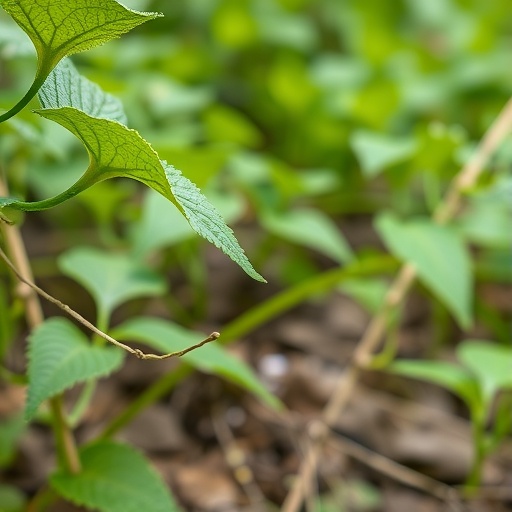In a pioneering study led by Pereira, C.C.A., de Lima, M.A., and Roberto, M.M., researchers have shed light on the environmental and health implications of the widely used fungicide, tebuconazole. As agriculture increasingly relies on synthetic chemicals to combat plant diseases, understanding the residual concentrations of these substances in the environment becomes paramount. This investigation delves into the ecogenotoxicological impacts of tebuconazole, revealing the complexities of its persistence and effects on ecosystems and human health.
Tebuconazole is a member of the triazole class of fungicides, renowned for its effectiveness in controlling a variety of fungal pathogens. However, its widespread application has raised concerns about its environmental persistence and potential toxicity. In this study, the authors meticulously collected and analyzed samples from various agricultural sites where tebuconazole was applied. By measuring its residual concentrations, the researchers aimed to determine the extent of this chemical’s longevity in the environment, offering critical insights for regulatory frameworks.
The findings of this research are significant, highlighting detectable levels of tebuconazole even months after application. These residual concentrations pose questions about the ecological balance within treated areas. The study’s authors discussed the implications of these findings on biodiversity, particularly in soil and aquatic ecosystems. Such persistence may disrupt the natural habitats that are essential for various organisms, leading to long-term ecological consequences.
In addition to environmental implications, this ecogenotoxicological assessment illuminates potential health risks associated with cumulative exposure to tebuconazole. Though primarily utilized for agricultural purposes, runoff and soil migration can lead to unintended exposure routes for humans and wildlife alike. The exposure risks extend beyond agricultural workers, possibly impacting communities near treated fields. This raises an urgent need to reassess safety guidelines to protect public health.
A critical aspect of this research is the assessment of the ecotoxicological effects of tebuconazole on non-target organisms. In their extensive analysis, the authors evaluated various organisms, including beneficial microbes, insects, and aquatic life, determining their sensitivity to tebuconazole exposure. Such findings are crucial in understanding the broader ecological ramifications, as benign substances in one context may be harmful in another, particularly at varying concentrations.
The study also emphasizes the importance of ongoing monitoring and research to establish a comprehensive understanding of tebuconazole’s effects. As climate change and agricultural practices evolve, so too do the interactions between pesticides and environmental factors. The researchers highlighted the necessity for adaptive management strategies that consider the dynamic nature of ecosystems and the challenges posed by synthetic chemicals.
Furthermore, this study advocates for the development and adoption of alternative pest management strategies. Integrated Pest Management (IPM), which combines biological, cultural, and chemical practices, presents a viable way to reduce reliance on synthetic fungicides. By promoting biodiversity and enhancing soil health, IPM can mitigate the potential negative effects of pesticides while maintaining crop productivity.
In a broader context, this investigation calls for a reevaluation of pesticide regulations globally. As international standards grapple with the implications of chemical residues, the findings from Pereira and colleagues provide a compelling argument for stricter benchmarks and proactive policies. Legislators and regulatory bodies must balance the benefits of fungicide use against the evidence of their long-lasting impacts on the environment and public health.
The findings presented in this study serve as a reminder of the interconnectedness of human activity, agricultural practices, and ecological health. As the global population grows and the demand for food increases, the responsibility falls on both scientists and policymakers to ensure that agricultural advancements do not compromise environmental integrity. This research by Pereira and his team represents a significant step towards understanding and mitigating the risks associated with chemical fungicides.
In conclusion, this study comprehensively evaluates the residual concentrations of tebuconazole and its ecogenotoxicological impacts, emphasizing the need for continuous monitoring and research in the field of environmental toxicology. The insights gained serve both as a warning and a guide, pushing for a future where agriculture can thrive without posing significant risks to ecosystems and human health. The careful balance between productivity and environmental stewardship is more critical now than ever, and this research contributes significantly to that ongoing conversation.
The authors’ work illuminates not only the toxicological profile of tebuconazole but also the overarching narrative of how agricultural practices must evolve alongside increasing scientific knowledge. This research thus not only raises awareness but also fosters a collaborative approach towards sustainable agricultural practices, ensuring that both human and ecological health are protected for generations to come.
Subject of Research: Residual concentrations of the fungicide tebuconazole and its ecogenotoxicological effects.
Article Title: Residual concentrations of tebuconazole based fungicide—an ecogenotoxicological assessment.
Article References: Pereira, C.C.A., de Lima, M.A. & Roberto, M.M. Residual concentrations of tebuconazole based fungicide—an ecogenotoxicological assessment. Environ Sci Pollut Res (2025). https://doi.org/10.1007/s11356-025-37135-3
Image Credits: AI Generated
DOI: https://doi.org/10.1007/s11356-025-37135-3
Keywords: Tebuconazole, fungicide, ecogenotoxicology, environmental toxicity, pesticide regulation, agricultural practices, sustainability, Integrated Pest Management.




